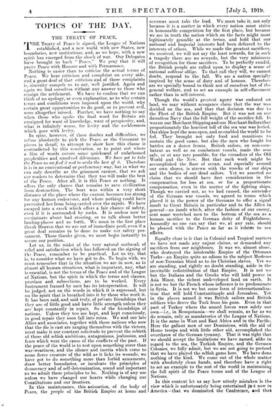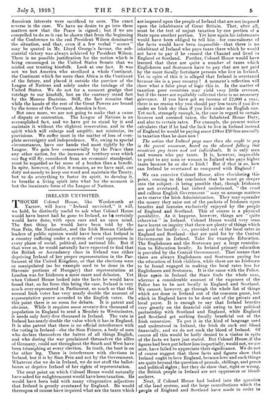TOPICS OF THE DAY.
■ •■•••••••■••■
THE TREATY OF PEACE.
THE Treaty of Peace is signed, the League of Nations established, and a new world with new States, new boundaries, new institutions, and, as we hope, with a new spirit has emerged from the shock of war. Our Delegates have brought us back "Peace." We pray that it will prove Peace with Honour and with Permanence. • Nothing is easier than to criticize the actual terms of Peace. We hear criticism and complaint on every side, and a great deal of that criticism and of those complaints is, sincerity compels us to say, well justified. Again and again we find ourselves without any answer to those who arraign the settlement. We have to confess that we can think of no apology, or even explanation, as to why certain terms and conditions were imposed upon the world, why certain great opportunities to do good, or to prevent evil, were altogether missed. Further, we have nothing to say when those who spoke the final word for Britain are arraigned for want of knowledge, want of perspicuity, and, what is infinitely worse, for levity and the recklessness which goes with levity. In spite, however, of these doubts and difficulties, we refuse absolutely to pick the Peace or the Covenant to pieces in detail, to attempt to show how this clause is contradicted by this reservation, or to point out where a film of words coves some quicksand of unfathomed perplexities and unsolved dilemmas. We _have got to take the Peace as we find it and to make the best of it. Therefore it is in no conventional or perfunctory way, but in what we can only describe as the grimmest earnest, that we ask our readers to determine. that they too will make the best of the Peace. After all, it is this Peace or nothing. It offers the only chance that remains to save civilization from destruction. The boat was within a very short distance of the place where the current becomes too strong for any human endeavour, and where nothing could have prevented her from being carried over the rapids. We have escaped into a creek which offers a fair chance of safety, even if it is surrounded by rocks. It is useless now to recriminate about bad steering, or to talk about better landing-places and so forth. We must in the first place thank Heaven that we are out of immediate peril, even if a great deal remains to be done to make our safety permanent. Those thanks given, we must begin instantly to secure our position.
Let us, in the midst of the very natural outbreak of relief and satisfaction which has followed on the signing of the Peace, remember to be practical. Let U8 try, that is, to consider what we have got to do. To begin with, we must remember that in the situation we are in now, as in almost all human situations, what is important, nay, what is essential, is not the terms of the Peace and of the League of Nations, but the spirit in which the terms and clauses, provisos and subsections, are to be worked. Every Instrument framed by men has its interpretation. It will be judged, not on the words in which it is expressed, but on the spirit that is breathed into it by those who work it. It has been said, and said truly, of private friendships that they are of little good andhave little strength unless they are kept constantly in repair. So of the friendships of nations. Unless they too are kept, and kept consciously, in good repair they soon fall into ruins. We and our late Allies and associates, together with those nations who now that the die is cast are ranging themselves with the victors, must make it our constant solicitude to prevent the rebirth of those old selfish ambitions, antagonisms, jealousies, and fears which were the cause of the conflicts of the past. If the peace of the world is to rest upon something surer than war-weariness, and the silence and inertia which come to some fierce creature of the wild as it licks its wounds, we have got to do something more than forbid armaments, draw better boundaries, or inculcate the principles of democracy and of self-determination, sound and important Its we admit these principles to be. Nothing is of any use unless we have changed our hearts while changing our Constitutions and our frontiers.
In this 'maintenance, this animation, of the body of Peace, the people of the British Empire at home and overseas must take the lead. We _must take it, not only because it is a matter in which every nation must strive in honourable competition for the first place, but because we are in truth the nation which on the facts might most legitimately grumble at the terms, and hold that our national and Imperial interests had been deferred to the interests of others. While we made the greatest sacrifices, we received, we will not say the least rewards, for in such a tragedy there are no rewards, but the very minimum of recognition for those sacrifices. To be perfectly candid, the British people are called upon to display a sense of national noblesse oblige. To that call they will, we cannot doubt, respond to the full. We are a nation specially inspired by the sense of duty and of honour. Therefore are we specially bound to think not of ourselves but of the general welfare, and to set an example in self-effacement rather than in self-interest.
Though the world's greatest agony was endured on land, we may without arrogance claim that the war was decided on the sea, and that that decision was due to the Fleet of the British Empire. But it was not on our dauntless Navy that the full weight of the sacrifice fell. It was on our Merchant Shipping and our Merchant Sailors that proportionately the heaviest toll of the sea war was levied. Our ships kept the seas open, and so enabled the world to be fed. They brought not only food and munitions to sustain the good cause, but also the men who fought its battles on a dozen fronts. British sailors, on non-combatant as well as on combatant vessels, made the seas safe, or at any rate possible, for the crusaders of the Old World and the New. But that such work might be accomplished the floor of ocean, and especially around our own shores, is strewn with the wrecks of our ships and the bodies of our dead sailors. Yet we asserted no claim that we should have first consideration in the compensation for loss at sea, or for a proportionate compensation, even in the matter of the fighting ships. Though we carried out, as we had caused, the surrender of the German war vessels, we agreed to terms which placed it in the power of the Germans to offer a signal insult to Great Britain in particular and to the Allies in general—an insult which, after the fashion of our enemy, sent some wretched men to the bottom of the sea as a human sacrifice to the German deity of Frightfulness. Assuredly no one can say that we, at any rate, should be pleased with the Peace so far as it relates to -sea affairs.
Equally clear is it that in Colonial and Tropical matters we have not made any unjust claims, or demanded any sacrifices from our neighbours. It was we, almost alone, who destroyed the intolerable Empire of the Ottoman Turks—an Empire quite as odious to the subject Moslems of non-Turanian blood as to its Christian slaves. Yet we are standing, and rightly no doubt standing, aside in the inevitable redistribution of that Empire. It is not we but the Italians and the Greeks who will hold power in Asia Minor, the richest undeveloped land on earth. It is not we but the French whose influence is to predominate in Syria. It is not we but some form of internationalization that will hold Constantinople and Jerusalem. Yet in the places named it was British sailors and British soldiers who drove the Turk from his guns. Even in that part of Turkey where the armed forces were solely our own--i.e., in Mesopotamia—we shall remain, as far as we do remain, only as mandatories of the League of Nations. It is the same in West and East Africa and in the Pacific-. Here the gallant men of our Dominions, with the aid of Home troops and with little other aid, accomplished the overthrow of the German tyranny. That it was right that we should accept the limitations we have named, alike in regard to the sea, the Turkish Empire, and the German Colonies, we fully admit, but we are not going to pretend that we have played the selfish game here. We have done nothing of the kind. We come out of the whole matter with absolutely clean hands, and therefore have a right to set an example to the rest of the world in maintaining the full spirit of the Peace terms and of the League of Nations.
In this context let us say how utterly mistaken is the view which is unfortunately being entertained jut now in America—that we dominated the Conference, and that American interests were sacrificed to ours. The exact reverse is the case. We have no desire to go into these matters now that the Peace is signed ; but if we are compelled to do so it can be shown that from the beginning of the Conference to the end President Wilson dominated the situation, and that, even if a few verbal " scores " may be quoted in Mr. Lloyd George's favour, the substantial victory was always achieved by President Wilson. There is no possible justification for the notion which is being encouraged in the United States Senate that we misled our trusting kinsfolk. Look at one fact. It was not we but America who sterilized a whole Continent, the Continent which far more than Africa is the Continent of the future, and placed it outside the purview of the League of Nations and solely under the tutelage of the United States. We do not for a moment grudge that tutelage to our kinsfolk, but on the contrary stand fast by the Monroe Doctrine. Still, the fact remains that while the hands of the rest of the Great Powers are bound by the terms of the Covenant, America is free.
But once more, we are not going to make that a cause of dispute or contention. The League of Nations is an accomplished fact, and we have got to stand by it and maintain it without the slightest reservation, and in the spirit which will enlarge and amplify, not minimize, its provisions. We suffer most in the matter of loss of complete sovereignty and independence. We, owing to special circumstances, have our hands tied most tightly by the League. We gain less commercially by the Peace than any other nation, for the increase of territory over which our flag will fly, considered from an economic standpoint, Must be regarded as far more of a burden than a benefit. In spite, however, of this, it remains, as we have said, our duty not merely to keep our word and maintain the Treaty, but to do everything to foster its spirit, to develop it, to breathe a living spirit into what for the moment is but the inanimate form of the League of Nations.















































 Previous page
Previous page